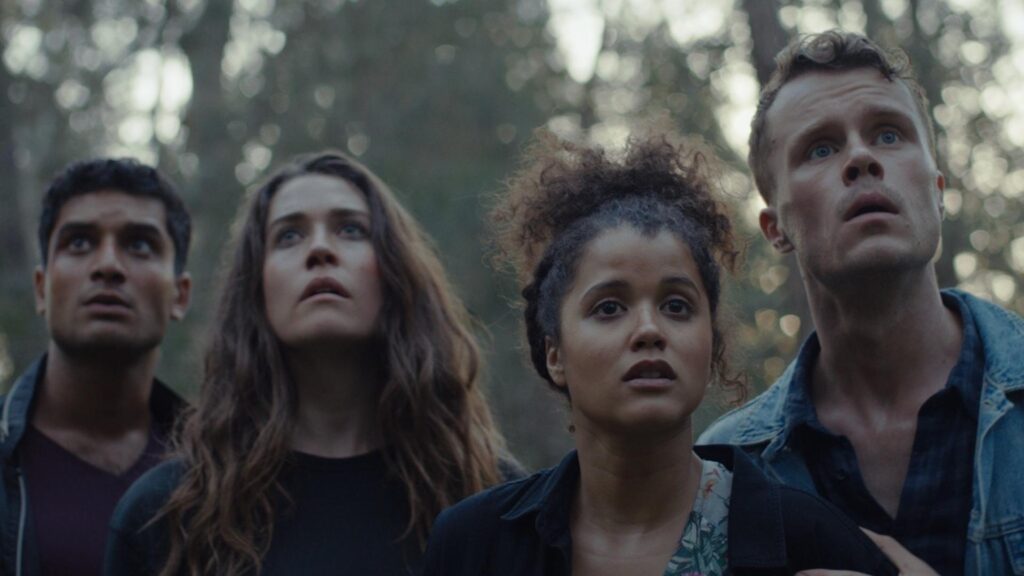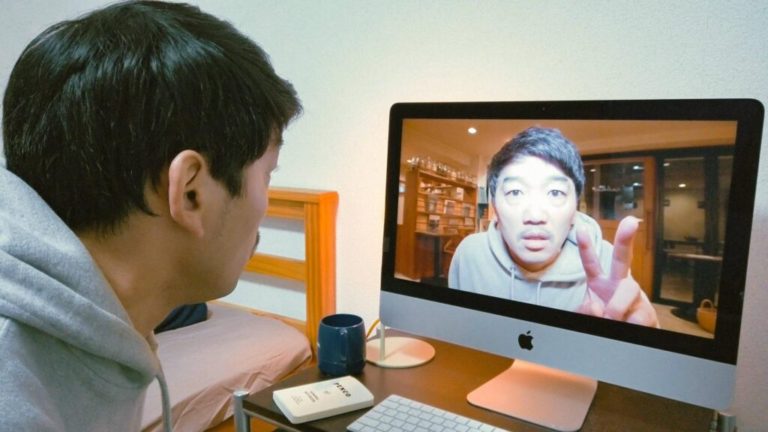Beyond the Infinite Two Minutes (2021 | Japan | 70 minutes | Junta Yamaguchi)
What if the two-minute delay between a business’s surveillance camera and its remote monitor could act as a two-way communication device with the future? That’s the premise of Beyond the Infinite Two Minutes, a delightfully fun little Japanese time-travel trifle by writer Makoto Ueda (The Night Is Short, Walk on Girl) and first-time feature director Junta Yamaguchi.
Kato (Kazunari Tosa) notices a strange thing after closing up his café one night: his computer monitor in his home is showing footage from the café’s surveillance camera, and in that footage is himself, talking in real time to the version of himself watching. And he can talk back! He quickly realizes there’s something unusual going on here, and a motley crew of friends, coworkers, and neighbors assemble to test the limits of what they can do with the ability to communicate with the past and see two minutes into the future.
The time-travel logistics are iffy, and best when not dwelt on for too long, but the film also knows that what it’s creating is a paradox. (“Time travel” isn’t even quite the right term, as nobody in this film travels through time except in the usual way, forward at 60 seconds per minute; they just also communicate across time in impossible ways, Lake House-style.) Characters frequently express the concern that they are being controlled by the future, going along with what they’re instructed by their future selves to do out of a sense of obligation to keep the timeline clean. As things widen out toward the end, the central metaphor reveals itself with some clarity: the idea of feeling controlled in the present by expectations of the future isn’t necessarily one that’s limited to science fiction.
But the story’s scientific specifics are not where the delight in this film lies, anyway. It’s shot so as to appear to be a single take, with a free-floating camera that really seemingly never has an opportunity to cut – but of course this is not possible in a practical sense, because these actors interact with themselves via screens. We see the same action repeated from multiple angles at different times, but it all flows together so smoothly it feels completely seamless. (Even more impressively, the whole thing was shot on an iPhone, yet has a totally cinema-ready quality.) At this point the “one-take” technique isn’t so much a mind-blower as a somewhat common gimmick, but this film uses that gimmick entirely in the service of its story, and does it in a remarkably proficient way. There are a few behind-the-scenes shots included alongside the end credits, and I’d be very interested to see quite a bit more of what that making-of process was like.
The tone here is one of light, sometimes absurdist comedy, even when the subject matter threatens to get heady or heavy – this is a film that had a cute little nugget of a sci-fi idea, and just wanted to have an adorable bit of fun with it. And at that it absolutely succeeds.

The Greenhouse (2021 | Australia | 90 minutes | Thomas Wilson-White)
There’s another sci-fi-lite film in NIGHTSTREAM’s 2021 lineup that also deals with time travel, albeit with a much heavier tone.
In Australian writer/director Thomas Wilson-White’s debut feature, a family has been fractured by the loss of a mother, and they’re awkwardly reuniting for a weekend birthday celebration. Repressed issues are coming to the forefront – especially for Beth (Jane Watt), the only one of four siblings (all adopted) to have continued living at home with their remaining grieving mother.
And then one night, Beth discovers a heavily fogged area in the backyard that seems to have voices coming from within it. When she wanders inside, she finds a greenhouse that seems to act as a portal to the past, where she can revisit memories of her family in happier times. She’s seduced by the idyllic nostalgia into spending more and more time in this dreamy past world – but, surprise! Not everything here is as perfect as it seems. Soon this family is faced with the choice of resolving their issues, or losing each other altogether.
The spirit here is dreamy and wistful, bolstered by a gauzy sun-dappled seafoam-green-heavy color scheme, free-floating handheld cinematography, and tender keyboard-driven score. Everyone’s actions are infused by grief as well as affection and nostalgia. There’s very little to laugh about here and only a few brief moments for anyone to reasonably feel scared – mostly, this is a gently sad family drama, heightened via its genre elements into intense stakes while dealing humanely and naturalistically with very recognizable characters, emotions, and issues.
Images courtesy of NIGHTSTREAM.
Beyond the Infinite Two Minutes (with a director’s intro) and The Greenhouse are both available for viewing via NIGHTSTREAM’s Eventive platform until midnight PST at the end of Wednesday, October 13th.


